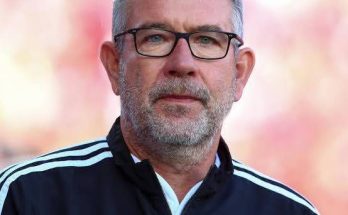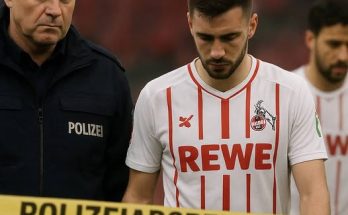Per Shams Charania, Giannis Antetokounmpo has not made any definitive decisions on his long-term plans, and that single sentence has sent a ripple of speculation through the NBA world. Whenever a player of Giannis’ caliber is mentioned in the same breath as uncertainty, fans, analysts, and executives across the league start to lean in, their ears perked up, wondering what the future might hold. Giannis is not just another All-Star or even another superstar—he is the cornerstone of the Milwaukee Bucks, a two-time MVP, NBA champion, Finals MVP, and one of the most dominant two-way forces the game has ever seen. His combination of size, speed, strength, and skill has made him the face of the franchise and arguably one of the faces of the league itself. When a player like that even hints at the possibility of change, the entire landscape of the NBA can shift in an instant.
The phrasing from Charania’s report is important because it isn’t a declaration of intent to leave, nor is it a firm commitment to stay. It’s a careful acknowledgment that Giannis is keeping his options open. In today’s NBA, this kind of openness can be strategic—it gives the player leverage over his current team while also keeping other teams intrigued. For Milwaukee, it’s both a reminder and a warning: continue to build a championship-caliber roster, keep Giannis happy, and maintain the competitive edge, because nothing is guaranteed. For rival teams, it’s an invitation to start imagining scenarios in which Giannis could be wearing a different jersey, leading their team to glory.
This moment is particularly interesting because Giannis has never been the kind of player who plays the media game or fuels rumors for the sake of drama. Since being drafted 15th overall in 2013, he has embraced Milwaukee, a small market team that believed in him when he was still a raw prospect from Greece. His loyalty has been one of his defining traits, and it has been reciprocated by the organization’s commitment to building around him. The Bucks traded for Jrue Holiday, extended Khris Middleton, and made bold moves to keep their championship window open. That 2021 title was proof that their formula worked, and it solidified Giannis’ place in NBA history. But the NBA is not static, and windows close faster than teams often expect. Injuries, age, cap constraints, and competition can all conspire to erode even the strongest contender’s chances.
The Bucks have had their share of ups and downs since that title run. They’ve dealt with playoff disappointments, coaching changes, and the challenge of keeping their supporting cast healthy and productive. Damian Lillard’s arrival before the 2023–24 season was a major swing aimed at giving Giannis the elite co-star he deserved, but integrating such a massive change takes time. The team’s performance since then has been scrutinized under a microscope, and in the NBA’s hyper-competitive Eastern Conference, even the slightest slip can lead to questions about the future. Giannis’ decision to avoid committing long-term might simply be his way of maintaining accountability within the organization. In other words, it could be less about wanting to leave and more about making sure the Bucks stay aggressive and avoid complacency.
From a player empowerment perspective, Giannis is in an enviable position. He is still in his prime, with years of elite performance ahead of him, and any team in the league would move mountains to acquire him. That leverage allows him to dictate the terms of his career—whether that’s pushing the Bucks to continue upgrading the roster or keeping open the possibility of a move if the team fails to remain competitive. In today’s NBA, superstars have realized that they no longer need to spend the entirety of their careers in one place if the conditions aren’t right. While Giannis has expressed deep affection for Milwaukee and its fans, he has also made it clear in past interviews that winning is his top priority. That mindset means his loyalty is tied to the franchise’s ability to contend for championships year after year.
For the Bucks’ front office, Charania’s report serves as both a challenge and a rallying cry. General manager Jon Horst and his staff will need to ensure that the roster around Giannis remains not just good, but elite. They’ll have to manage contracts, balance the salary cap, and make smart trades to keep the team competitive in an Eastern Conference that now includes dominant forces like the Boston Celtics, New York Knicks, and a resurgent Philadelphia 76ers. The Bucks cannot afford to take a wait-and-see approach; they have to prove to Giannis in real time that staying in Milwaukee gives him the best chance to win more titles.
Meanwhile, around the league, executives will be quietly (and maybe not so quietly) preparing for the possibility—however small—that Giannis becomes available. Teams like the Miami Heat, Golden State Warriors, and even the Los Angeles Lakers have historically been aggressive in pursuing top-tier talent, and if Giannis were to signal any openness to a trade, the offers would be astronomical. The combination of his talent, work ethic, and marketability makes him one of the most valuable players in NBA history. Even if a trade is not on the immediate horizon, the mere fact that his future is “undecided” will encourage rival teams to keep lines of communication open with the Bucks and Giannis’ camp.
For fans in Milwaukee, this news is a mix of anxiety and cautious optimism. On one hand, Giannis has always spoken warmly about his adopted city, the fans, and the life he has built there with his family. On the other hand, the NBA is a business, and sentimentality often takes a back seat to winning and legacy. Giannis knows that his prime years are limited, and he will want to maximize them by competing for titles. The Bucks have delivered before, but repeating that level of success is never guaranteed.
There’s also the reality that media speculation can sometimes take on a life of its own. A single report can snowball into daily debates on sports talk shows, social media campaigns by rival fanbases, and endless “what if” trade scenarios. Giannis is undoubtedly aware of this dynamic, which is why his public comments have generally been measured and focused on the present. By not making a definitive decision now, he retains flexibility, keeps the pressure on the Bucks, and avoids locking himself into a situation that might change over the next year or two.
In many ways, Giannis’ current stance mirrors the approach taken by other modern superstars like LeBron James, Kevin Durant, and Kawhi Leonard. These players have all demonstrated the value of short-term contracts or non-committal statements, allowing them to adapt to changing circumstances. For Giannis, the decision may ultimately come down to whether he believes the Bucks can sustain a championship-level roster in the long run. If they can, there is every reason to believe he will remain the face of Milwaukee basketball. If not, history suggests that even the most loyal superstars are not immune to seeking new opportunities.
What makes this moment particularly fascinating is that it’s happening while Giannis is still at the height of his powers. He is averaging dominant numbers, continuing to refine his game, and showing no signs of slowing down physically. That means his decision—whenever it comes—will be about competitive opportunity rather than decline or injury. It will be about chasing greatness, adding to his legacy, and positioning himself to be remembered not just as one of the greats of his era, but as one of the greatest players in NBA history.
Until then, every word from Giannis and every move by the Bucks will be dissected for clues. Fans will look for signs in his body language, his interactions with teammates, and even his social media activity. Analysts will debate whether his reluctance to commit is a bargaining tool or a genuine reflection of uncertainty. Opposing teams will keep dreaming, and Milwaukee will keep working to ensure those dreams never become reality.
For now, the only certainty is that Giannis Antetokounmpo’s long-term future remains unwritten. Whether that future includes more championships in Milwaukee or a shocking move to a new city is a question that will hang over the NBA until the day he finally decides. And in a league where the fortunes of franchises can turn on a single player’s choice, that decision—whenever it comes—will be one of the most important in recent memory.
ChatGPT said:
PER SHAMS: GIANNIS ANTETOKOUNMPO’S FUTURE REMAINS UNWRITTEN AS BUCKS STAR REFRAINS FROM LONG-TERM COMMITMENT
Per a recent report by Shams Charania, Giannis Antetokounmpo has not made any definitive decisions on his long-term plans, a development that has sent quiet but forceful shockwaves through NBA front offices, fanbases, and analyst circles alike. When a player of Giannis’ stature—two-time MVP, Finals MVP, NBA Champion, and perennial Defensive Player of the Year candidate—remains publicly non-committal about his future, it demands attention. He’s not just a star in Milwaukee; he is the foundation, the axis around which the entire franchise orbits. His every word carries weight, and his silence on long-term plans signals more than uncertainty—it signals leverage, intentional pressure, and perhaps introspection about what comes next in the next phase of his Hall of Fame-bound career.
It’s worth emphasizing that Giannis has not declared any discontent, nor has he hinted at a desire to move on from Milwaukee. In fact, Antetokounmpo has long been one of the most vocal advocates of small-market loyalty, a player who grew up in the franchise and matured into one of the league’s most dominant forces in a city often overlooked by big-name free agents. But in the modern NBA, loyalty doesn’t mean inflexibility, and stardom comes with options. The NBA is no longer the league where top-tier talents remain with one team for decades. In this era of player empowerment, openness about one’s long-term plans is less a red flag and more a sign of business acumen.
Giannis’ decision to remain uncommitted is not necessarily a signal that he’s plotting an exit. It’s possible—and likely—that he’s applying internal pressure on the Milwaukee Bucks organization to keep their championship window open, or at least competitive. The Bucks’ front office knows it has to do everything in its power to sustain a roster that gives Giannis a real shot at competing deep into the playoffs. Since capturing the 2021 NBA title, the team has experienced a few playoff letdowns, roster inconsistencies, and the eventual trade for Damian Lillard—a swing-for-the-fences move designed to reassert the team’s title ambitions. But winning in the modern NBA is never straightforward, and sometimes even the biggest roster moves don’t guarantee chemistry or championship momentum.
This kind of nuanced decision-making reflects the evolution of Giannis as both a player and a person. Early in his career, he was the quiet, hard-working kid from Greece just thankful to be there. Now, he is a global brand, a player with not just league stature but also the personal gravitas to reshape narratives and influence franchises. Staying noncommittal affords him the flexibility to see how things unfold—whether Damian Lillard meshes well with his game, whether the team stays healthy, whether the front office shows consistent urgency, and whether the Bucks remain as serious about championships as he is. It’s a signal: keep the pressure on, stay aggressive, or risk watching the franchise’s greatest player since Kareem Abdul-Jabbar explore alternatives.
In today’s NBA, the idea of a player using his leverage is no longer taboo. LeBron James famously signed shorter deals throughout his second stint in Cleveland to maintain pressure on the organization. Kawhi Leonard has done the same in Los Angeles. Even Stephen Curry and Kevin Durant, who have more or less publicly committed to their organizations, have wielded strategic silence or well-timed contract decisions to keep their teams responsive and dynamic. For Giannis, this moment may be less about dissatisfaction and more about alignment. If Milwaukee proves it remains aligned with his desire to be in the title hunt every year, the next long-term commitment could come quickly. If not, the doors open to an unpredictable future.
Giannis’ approach has also resonated with fans and analysts, not just because of the possibilities it invites, but because of the calculated calmness it displays. He isn’t creating drama or generating headlines for the sake of it. His reputation as a humble, team-first leader remains intact, and yet his subtle use of silence to influence internal culture is telling. It’s mature, it’s deliberate, and it’s the mark of a superstar who understands his value not just in terms of points per game, but in organizational direction and competitive culture.
The Bucks organization must now look inward and ask hard questions. Are they surrounding Giannis with the right blend of youth, experience, and high-level contributors? Is the coaching staff maximizing the team’s unique strengths? Is Damian Lillard the long-term answer at point guard alongside Giannis, or is this pairing a short-term attempt to rekindle championship viability? Those questions will be tested in real-time. If the team returns to championship form, Giannis’ next deal may be inked before the ink dries on the season’s final game recap. If the Bucks falter—especially in early playoff rounds or fail to make a deep postseason push—the decision becomes significantly more complex.
From the outside looking in, rival teams are undoubtedly keeping tabs. Front offices from Miami to Los Angeles, from Golden State to New York, are already drawing up hypotheticals and cap space projections. Some teams will inevitably begin restructuring their future planning around the remote possibility that Giannis could be available via trade or free agency down the line. This is the nature of the modern league, where the movement of one superstar can tilt the competitive balance and alter championship odds overnight. If Giannis ever indicates even a whisper of disinterest in staying with the Bucks long term, the resulting offers from other teams would be beyond astronomical—they’d be transformative.



